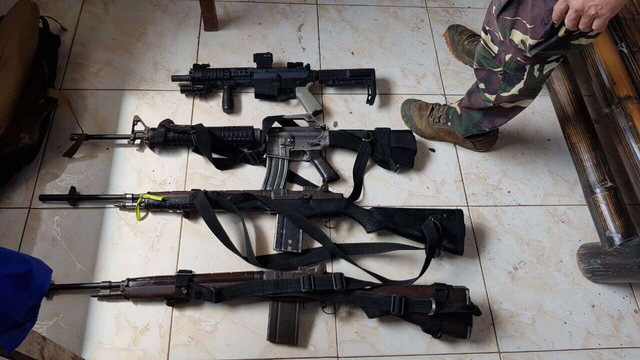ARMM Assemblyman Zia Alonto Adiong says clan disputes must be resolved to maintain peace and stability under martial law in Mindanao

WARRING FAMILIES. The military recovers 4 rifles after the Amanodin and Dipatuan clans exchanged gunfire on January 5, 2017. Photo from AFP
The Armed Forces of the Philippines (AFP) said it will not tolerate clan feuds after two families in Bacolod-Kalawi in Lanao del Sur exchanged gunfire, injuring 4 people.
The military issued a warning against warring clans on Saturday, January 6, a day after members of the Amanodin and Dipatuan clans traded bullets at around 4:30 pm.
“The AFP will not tolerate incidents of rido and will continue to conduct law enforcement operarions in cooperation with the Philippine National Police, while martial law is in effect," said Major General Rosseler Murillo, chief of the 1st Infantry Division.
The clash between the Amanodin and Dipatuan families lasted for about an hour, disrupting traffic along the highway at Bacolod-Kalawi municipality. (READ: Terror groups and clan wars: Mindanao's security threats)
Members of the Philippine Army’s 65th Infantry Battalion intervened in the fight, but they were shot at by unidentified armed men. The troops returned fire for about 15 minutes and was later able to implement a ceasefire between the warring families.
“The AFP will not tolerate incidents of rido and will continue to conduct law enforcement operarions in cooperation with the Philippine National Police, while martial law is in effect," said Major General Rosseler Murillo, chief of the 1st Infantry Division.
The clash between the Amanodin and Dipatuan families lasted for about an hour, disrupting traffic along the highway at Bacolod-Kalawi municipality. (READ: Terror groups and clan wars: Mindanao's security threats)
Members of the Philippine Army’s 65th Infantry Battalion intervened in the fight, but they were shot at by unidentified armed men. The troops returned fire for about 15 minutes and was later able to implement a ceasefire between the warring families.
Four members of the Amanodin family were injured after the fight.
According to Autonomous Region in Muslim Mindanao Assemblyman Zia Alonto Adiong, clan disputes must be resolved to maintain peace and stability as martial law continues to be implemented over the entire Mindanao.
“We would advise our security sector to strengthen its partnership with the civilian authority by working closely on any peace resolution initiaves with the community leaders and LGUs (local government units) to appreciate the cultural dynamics involve in resolving ridos,” said Adiong.
He said authorities must ensure loose firearms will not fall into the wrong hands and must stop the selling of unregistered firearms in the market.
“The objective really is ending family disputes permanently, not simply to impose temporary ceasefire,” said Adiong.
President Rodrigo Duterte declared martial law in Mindanao after government troops clashed with homegrown terrorists from the Maute Group and the Abu Sayyaf Group in Marawi City on May 23, 2017. (WATCH: Marawi: 153 days of war)
On October 17, 2017, Duterte declared the city free from terrorists. After getting Congress approval to extend martial law until the end of 2017, the President got lawmakers nod to further extend the imposition of martial law in Mindanao until December 31, 2018. (READ: Duterte thanks Congress for extending martial law in Mindanao)
The President justified that an extended martial law would "totally eradicate" Islamic State (ISIS)-inspired terror groups in the entire region.
According to Autonomous Region in Muslim Mindanao Assemblyman Zia Alonto Adiong, clan disputes must be resolved to maintain peace and stability as martial law continues to be implemented over the entire Mindanao.
“We would advise our security sector to strengthen its partnership with the civilian authority by working closely on any peace resolution initiaves with the community leaders and LGUs (local government units) to appreciate the cultural dynamics involve in resolving ridos,” said Adiong.
He said authorities must ensure loose firearms will not fall into the wrong hands and must stop the selling of unregistered firearms in the market.
“The objective really is ending family disputes permanently, not simply to impose temporary ceasefire,” said Adiong.
President Rodrigo Duterte declared martial law in Mindanao after government troops clashed with homegrown terrorists from the Maute Group and the Abu Sayyaf Group in Marawi City on May 23, 2017. (WATCH: Marawi: 153 days of war)
On October 17, 2017, Duterte declared the city free from terrorists. After getting Congress approval to extend martial law until the end of 2017, the President got lawmakers nod to further extend the imposition of martial law in Mindanao until December 31, 2018. (READ: Duterte thanks Congress for extending martial law in Mindanao)
The President justified that an extended martial law would "totally eradicate" Islamic State (ISIS)-inspired terror groups in the entire region.

No comments:
Post a Comment
Note: Only a member of this blog may post a comment.